
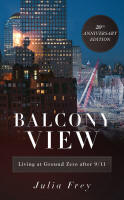 It changed everything. We remember where we were when we heard the dreadful news and saw the towers fall, images etched forever in our memories. Now, 20 years later, we’re inundated with pundits, politicians, and historians telling us what it all meant then, what it means for America now and going forward.
It changed everything. We remember where we were when we heard the dreadful news and saw the towers fall, images etched forever in our memories. Now, 20 years later, we’re inundated with pundits, politicians, and historians telling us what it all meant then, what it means for America now and going forward.It’s worth listening to people who lived through it. Julia Frey, whose poem “For Ron, Dead Ten Years” appeared here a few months ago, was there when the planes hit and wrote about it--a gripping first-hand experience:
Very quietly Ron said, “You know, I think the Towers are going to go. Maybe we’d better get out of here.”
We suddenly realized that if either of the Towers fell at a certain angle, our building was directly in the line of fall. Above the raging flames, the perpendicular steel I-beams were beginning to bulge out, softening in the heat.
Again his unnaturally quiet voice, “I can’t stay here. If the Towers fall on us, I’ll die of fright.”
September Song
by Sally Zakariya
It seemed like the ruination
of everything yet we went on
some things got better, some got worse
and we were left marveling
at what we could handle, wondering
what would come next
Three miles from the Pentagon
we saw a rain of objects, stuffing
from airplane seats, floating,
drifting, insubstantial yet
consequential, some landing
on the office roof while inside
we watched it all unfold
in real time on the screen
Years later we are still wondering …
wondering after a summer
of destruction overseas, disparity
at home, slaughter of innocents
in the streets, dreading now
what could come next
September 12th
by Jacqueline Jules
Muscled men with sun-drenched skin
were out the next morning at 9 a.m.
fighting weeds with gas-powered blades.
After hours of watching the smoking rubble
of collapsed buildings on a TV screen,
it was a comfort to sit at a stoplight
and watch men sweat
over bushes and green grass
in the bright September sun--a comfort
to see others resuming jobs as if
the lives we led on Monday still mattered.
Yesterday's siege of smoke and sirens
had not touched this tree-lined street
too far from the Pentagon to smell the flames.
I drove on familiar roads,
flanked by buildings and sidewalks
unchanged by the dark voice on the radio
reporting the dead and missing.
Except for light traffic, the streets
appeared to lead back to Monday's
aggravation over a broken copier and
cheap toilet paper in the ladies--
not stories of spouses who saw the plane hit,
children who felt the rumble in their classrooms.
I drove on, recalling the wide blue eyes
of the woman on the lobby couch,
silent tears inching down her cheeks
while the dark voice on the radio
reported smoke at the Pentagon,
swallowing the world
we knew before.
 You don’t have to be an astronomer to be entranced by the night sky. I’m a sucker for stars, so when he talks about constellations and planetary motion, I listen with awe to my husband, who knows enough about the sky to design and make sundials and astrolabes.
You don’t have to be an astronomer to be entranced by the night sky. I’m a sucker for stars, so when he talks about constellations and planetary motion, I listen with awe to my husband, who knows enough about the sky to design and make sundials and astrolabes.
Measurement and instruments are his domain; words are mine. My thanks to Gregory Luce and the good folks at Day Eight for publishing four of my poems, along with a gorgeous photo by Rochus Hess, in Bourgeon, a beautiful initiative to bring arts and audiences together around literary, visual, and performing works. Here’s one of my poems, which appeared online in late May:
Star Light, Star Bright
“The universe is under no obligation to make
sense to you.”--Neil deGrasse Tyson
I never asked the stars to spell your name
or said the sun should rise especially for us,
and when the full moon went into eclipse
I never thought night darkened just for us
and us alone.
There’s something to be said for planets,
how they ride their measured rings
around the sun, and something to be said
for meteorites, those rocky tears
the cosmos sheds.
But let science say what can be said
about it all--it makes no sense to me.
I watch in wonder as the heavens
wheel and drink it in, enthralled.
So when you talk of perihelion
or perigee, event horizon or
ecliptic, I nod, then smile inside
and think, how lucky that the stars
aligned for us.
.................................................................................................................................... Snow in August Last month I posted a poem called “Winter Memory,” which was a finalist in the Wingless Dreamer winter poetry contest and published in Snowdrops. That title caught poet Mike Levin’s eye, and he sent me his own poem by that name:
Snowdrops
Michael H. Levin
Who’d think
these slender stems
could pierce gunmetal snow
presenting arms through gusts
that polarize the hollows of my bones
yet here
they rise--demure
white caps, pure offerings
of spring: extended by
a netherworld whose darker invites
bide their time below.
.................................................................................................................................... Revise, Revise On my bulletin board, the postcard from the Poetry Society of America reminds me daily to revise and then revise again. You know how it is. You write a poem one morning, then sit back and feel good about it. By evening, you see it’s not so good after all. And the next day … Well, let’s just say your terrific new poem needs some work. Maybe a lot of work.
Revision, in other words, is an integral part of poetry.
“Revision is my favorite part of the writing process,” writes poet Maggie Smith on that terrific blog Lit Hub. “I relish the creative problem-solving more than the rush of getting it down. If you’re like me, your poem might go through anywhere from two to two hundred drafts before you’re satisfied enough with it to call it ‘done’ and send it out. Each revision, ideally, gets us closer to the poem we sense is there, waiting. The poem that will do the psychic or spiritual work we want it to do.”
"But,” Smith continues, “each revision can also pull us farther away from the initial spark of the poem. This tension, this push and pull, is what makes revision dynamic and exciting: we are hunting something but are not quite clear about what it looks like or how to find it."
Smith goes on to compare her published poem “At the End of Our Marriage, in the Backyard” with an early draft and finds that the two are surprisingly similar. What has changed, she writes, is sound and rhythm. “I’m looking and listening for consonants and vowels as I draft,” she says, “but also the rhythms of sentences.”
The moral of the tale, in Smith’s words: “The first draft of a poem is almost always the not-right words in the not-right order.” Read her essay here.
.................................................................................................................................... In Between
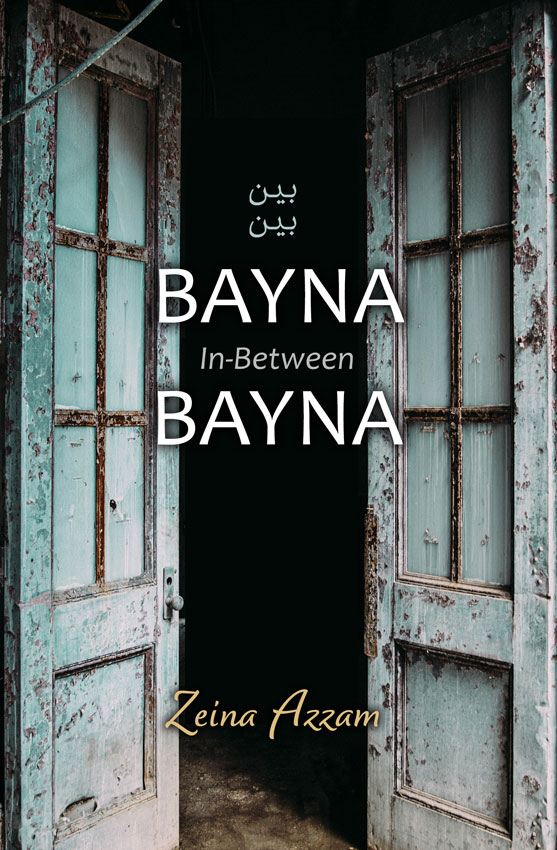 I was reading a news article about the fragile Israel-Gaza ceasefire when my friend’s book arrived.
Bayna Bayna: In-Between, by poet and Palestinian activist Zeina Azzam, is a moving and powerful exploration of what it’s like to be an immigrant. “It reflects the feeling of being in-between identities,” Zeina writes, “between home and exile, between childhood and adulthood, between wholeness and loss, between living and dying … somehow always in-between.”
I was reading a news article about the fragile Israel-Gaza ceasefire when my friend’s book arrived.
Bayna Bayna: In-Between, by poet and Palestinian activist Zeina Azzam, is a moving and powerful exploration of what it’s like to be an immigrant. “It reflects the feeling of being in-between identities,” Zeina writes, “between home and exile, between childhood and adulthood, between wholeness and loss, between living and dying … somehow always in-between.”
My family has been here for generations, so I’ve never had to feel the sad tug of a homeland left behind. But reading Zeina’s vivid, passionate poems, I feel a kinship with her and others who have been forced to leave the land they belong to, the land that once belonged to them.
Here is the first poem from Bayna Bayna: In-Between:
Colors for the Diaspora
by Zeina Azzam
Blue-green watery globe
tugging to a red core
we are a distant comet,
white cloud of unburnished rocks,
frisking the heavens
for an arc
to earth, sea, home.
Green-brown Palestine,
cactus fruit and wild thyme,
olive orchards, cypress trees…
we travel on your mountain tops
tethered by voices from suitcases
and the yaw of blackened keys.
Blue-black night
silver stars of ancestors
traveling a displaced orbit
around a lost sun, repeating:
when will we see the colors of our land,
when will we land….
.................................................................................................................................... And Speaking of Memory A little poem I wrote some years ago was kindly named a finalist in the Wingless Dreamer winter poetry contest and is published in Snowdrops. It’s spring now, verging rapidly into summer, but winter isn’t that far gone.
Winter Memory
by Sally Zakariya
For my father
Snow silent, white blind
I grasp the immensity
the distance from then to now
There is room under the waiting sky
for all that used to be
for all we had and never had
The smell of your pipe
the strength of your arm
the long life denied you
I summon them up
from the bleak expanse
as the snow falls
.
.................................................................................................................................... ‘Something Like a Life’
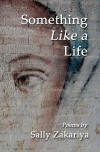 Putting it out there. That’s what poets do, day after day, hoping someone, somewhere, will respond. I can’t count how many rejections I’ve received (well, I probably could, but I don’t really want to). But each rejection makes that out-of-the-blue acceptance all the more gratifying. Even thrilling.
Putting it out there. That’s what poets do, day after day, hoping someone, somewhere, will respond. I can’t count how many rejections I’ve received (well, I probably could, but I don’t really want to). But each rejection makes that out-of-the-blue acceptance all the more gratifying. Even thrilling.
That’s how I felt when one of my favorite online poetry journals, Gyroscope Review, accepted my chapbook “Something Like a Life,” due out the end of April. Like a lot of my writing, the poems in this chapbook are about family and love ... not exactly exciting subject matter, but themes I think many people can relate to. If you’re one of those people, you can order a copy here. Meanwhile, here’s the title poem:
Ode to Trash
by Sally Zakariya
Something like a life
spills from the bin
breakfast egg shells
yesterday’s junk mail
a torn glove and its mate
worthless alone
like many of us
We have the capacity
to love entirely, even
bits and pieces we’ve
discarded--outdated,
unneeded, unwanted
until it’s too late
Love is a process of loss
the off-hand see you
the tossed-out letters
the distance from the other
the final farewell
I take out the trash unsure
the bin is big enough
to hold it all--all the debris
and detritus, the mistakes
and missteps, unsure
if I can live without
what I’ve cast away
.................................................................................................................................... A Friend Writes … Perhaps I should say “an email friend.” And perhaps it’s presumptive of me to call a woman I’ve never met a friend. But that’s one of the wonders of our interconnected cyber-society. Put something out there online, and you never know who, if anyone, will read it. But recently I got an email that began: “Thanks, first of all, for existing! And thanks for offering to let us lonely poets share a poem. I live in France where it’s hard to get much feedback. I hope someone will have thoughts on the poem below…”
The writer was Julia Frey, and my thoughts on her poem are that it’s a strong and visual narrative that tells a moving story. Here it is:
For Ron, Dead Ten Years
by Julia Frey
Today, I could swear I saw you crossing
the rue du Four a block ahead, in that black-visored cap
you wore before, and your worn bomber jacket
from the second-hand store in Trastevere market
complete with stab wound
and “Nicola” written in ballpoint pen on the label.
That summer we sublet in via Mamele,
though later we found a better Boob City, Jerusalem
breasting with cupolas. Rome too polluted to milk
for our long rambles. We came home coughing
from the catacombs.
Even then death hovered.
Today you looked just like you
before you were sick, confident profile
gangster chic, out of sync with the hesitant walk
you'd developed. When you took the last fall in New York
my shock, to come back to Paris and find
your letters kept coming, weeks after.
What on earth made you fall for
a nouveau pauvre Southern belle with worn-out
Persian rugs, an arm-long pedigree and a potty mouth?
Me the effete, you the resolute Bad Boy
from Brooklyn, bourgeois-hating, astoundingly reliable
in money matters. Always out to get laid.
You, who loved words too much to
defile with a one-night stand. To say fuck or shit
or read trash novels. You said it was the sex.
It kept us together
in beds and on beaches
for twenty-five years.
Now I'm a fresh fish drifting
in a different salt sea. I see France
from my bedroom. But beach-combing in Cannes I still watch
for a letter in a bottle. And I still go back to Paris
where certain days I
wear Nicola’s jacket.
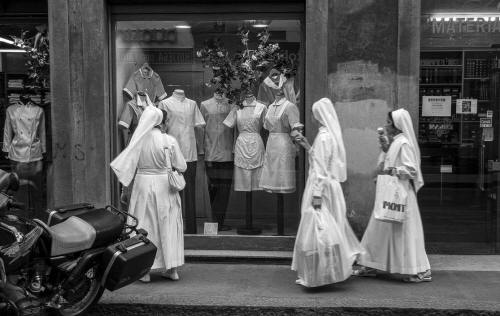 Nuns on an outing in Florence, photo by
Cameron Bloch.
....................................................................................................................................
Biblical Truths
Nuns on an outing in Florence, photo by
Cameron Bloch.
....................................................................................................................................
Biblical Truths
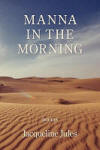 Poetry plays many roles, not least of which are healing and connection. Consider
Manna in the Morning, by Jacqueline Jules, just published by
Kelsay Books. In 40-some graceful poems, Jules reaches back to the Old Testament to bring valuable lessons to herself and her readers. It’s a book you’ll want to read with a friend.
Poetry plays many roles, not least of which are healing and connection. Consider
Manna in the Morning, by Jacqueline Jules, just published by
Kelsay Books. In 40-some graceful poems, Jules reaches back to the Old Testament to bring valuable lessons to herself and her readers. It’s a book you’ll want to read with a friend.But don’t take my word for it. “Manna in the Morning is, quite simply, a lovely book,” says Erika Dreifus, author of Birthright: Poems and The Practicing Writer newsletter. “As she revisits holy texts, Jacqueline Jules gracefully connects ancient stories with modern times, gaining insights into her own quandaries and gently suggesting paths through which all of us may traverse our conflicts and crises.”
I grew up on the same Bible stories as my friend Jackie did (though through an Episcopalian, rather than a Jewish, lens), but it takes a special poet to gently tease out their meanings for modern-day life. What lesson might the parting of the Red Sea, for example, have for us today? Here’s Jackie’s trenchant take:
Crossing the Red Sea
Jacqueline Jules
The rabbis say
Reuven and Shimon
crossed the Red Sea,
eyes down, grumbling,
so engrossed in grievances
they missed the miracle
of the waters parting.
Fleeing affliction,
I’ve been guilty, too,
of seeing only
the mud beneath my feet,
dwelling on the bricks
and burdened backs of Egypt,
ignoring outstretched arms
ready to hold me until
I reach the other side.
These are poems of faith and hope, of grief and consolation. Observing the sky in the gorgeously titled “Consolation of Clouds,” Jules feels sunlight streaming through clouds as if it were “fingers / reaching down / to wipe the tears / from my cheeks.” To which I can only add Amen.
Learn more about Jacqueline Jules here and here.
.................................................................................................................................... Poetry of Place
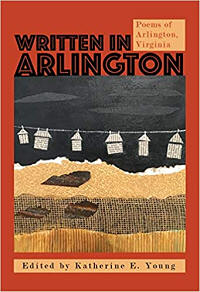 Look at a map of Washington, D.C., and you’ll see what might have been a perfect square but with a good chunk of land cut off by the Potomac River. Part of that chunk, which was ceded back to Virginia some time after the city was founded, is Arlington County. It’s an almost-urban suburb that probably has as much in common with the District as it does with the state. And it’s full of poets.
Look at a map of Washington, D.C., and you’ll see what might have been a perfect square but with a good chunk of land cut off by the Potomac River. Part of that chunk, which was ceded back to Virginia some time after the city was founded, is Arlington County. It’s an almost-urban suburb that probably has as much in common with the District as it does with the state. And it’s full of poets.One of the best known is Arlington Poet Laureate Emerita Katherine E. Young, who compiled an impressive collection of Arlington poems, Written in Arlington, published by Paycock Press. With its YouTube companion Spoken in Arlington, the anthology mirrors the county’s diversity in content as well as contributors. As Katherine puts it, “The poets whose work appears in Written in Arlington range from nationally known page poets to spoken word artists to high school students just beginning to write and perform, as well as a few ‘tourist’ poets who have written about Arlington while passing through.”
The bike trail, a local hardware store, the animal shelter, a pink house, hillbilly music, the cemetery, a couple of neighborhoods, a car covered with poetry magnets … these subjects and dozens more add up to a rich tapestry of place, add up to a community.
And yes (you knew this was coming), I do have a few poems in the collection, including this one:
September Song
Sally Zakariya
It seemed like the ruination
of everything yet we went on
some things got better, some got worse
and we were left marveling
at what we could handle, wondering
what would come next
Three miles from the Pentagon
we saw a rain of objects, stuffing
from airplane seats, floating,
drifting, insubstantial yet
consequential, some landing
on the office roof while inside
we watched it all unfold
in real time on the screen
Years later we are still wondering
…
wondering after a summer
of destruction overseas, disparity
at home, slaughter of innocents
in the streets, dreading now
what could come next
My thanks to Katherine, and to Arlington, for being part of such an endeavor, and such a place.
....................................................................................................................................
 When I retired and started writing poetry
instead of magazine articles, I joined a
writers’ group sponsored by the county’s senior
programs. A few months in, one woman asked why I
kept writing poems about insects. Why indeed? It
wasn’t on purpose, but the more I thought about
it, the more I realized that insects are not
uninteresting. As I wrote in the intro to my
resulting little book
Insectomania, “… who can fail to be
moved by a life cycle that starts with years of
grubbing, followed by a short span of mating,
and then death. Rather like our own lives, writ
small.” The poems weren’t my best, but I had fun
padding them with trenchant quotes on bugs and
Victorian naturalists’ illustrations of the
creatures. It seems I still write about insects
every now and then, and I’m delighted to say a
new literary journal called
Mycorrhizae
is publishing a poem of mine about bees in
its very first issue, now on the press.
When I retired and started writing poetry
instead of magazine articles, I joined a
writers’ group sponsored by the county’s senior
programs. A few months in, one woman asked why I
kept writing poems about insects. Why indeed? It
wasn’t on purpose, but the more I thought about
it, the more I realized that insects are not
uninteresting. As I wrote in the intro to my
resulting little book
Insectomania, “… who can fail to be
moved by a life cycle that starts with years of
grubbing, followed by a short span of mating,
and then death. Rather like our own lives, writ
small.” The poems weren’t my best, but I had fun
padding them with trenchant quotes on bugs and
Victorian naturalists’ illustrations of the
creatures. It seems I still write about insects
every now and then, and I’m delighted to say a
new literary journal called
Mycorrhizae
is publishing a poem of mine about bees in
its very first issue, now on the press.
Why I Do Not Trim My Mint
In the name of the bee--Emily Dickinson
In the herb
garden the mint slants
north, each stalk its own compass needle
Finding their
way, three bees hover over
the blossoms, drawn by the promise of pollen
Their busy buzz
lulls me as I laze
here on the porch, dreaming of blooms
and of the world
bees make possible
for us, a world of fields and fruitfulness
Cut the mint
before it flowers, they say
but where would these three forage then?
Mycorrhizae, you ask? So did I. It turns out a mycorrihza
is a symbiotic association between a fungus and a plant--a fit name for a
journal that describes itself as exploring “our lived experiences of place,
climate change, and nature.”
....................................................................................................................................
But Not All the Time As anyone can no doubt guess from the title of my blog, I’m not a big fan of strict meter and rhyme--especially when they force poets to twist syntax. Some writers handle this kind of poetry well; turns out I’m not one of them.
Turns out, too, that I’m not alone in noticing the lengths people can go to in slavish dedication to meter and rhyme. Recently, Patsy Anne Bickerstaff, a Virginia poet and author of Mrs. Noah's Journal, sent me a little poem she’s had fun with. She has used it, she says, “just to let everyone know what they didn't have to do!” And like me, she says she’s “not averse to verse by meter and rhyme … but not bound to it either.”
Autobiography, Chapter One
By Patsy Anne Bickerstaff
A poet there
was, once ‘pon a time,
Who verses forced to make them rhyme
Or into meter better fit;
Adept she did become at it.
Liberally she
used, “you see,”
So well it went with “thou” and “thee.”
Adjectives
beautiful and trite
And gay, she’d write with all her might.
Editors she oft
appalled
With rhymes that did not rhyme at all.
When offered
help, she cried, “Don’t start!”
“I do my writing from the heart!”
Tho’ she
submitted, o’er and o’er,
Rejections she received galore.
To shock she tried, with language blue;
The S.O.B.’s sent that back, too:
“Sorry, we
accept this not;
Can’t tell we you’re saying what?”
 June 19, of all days … the African-American girl
across the street chalked some moving words from
MLK on her family’s driveway and down onto the
street, and a nameless neighbor complained. The
county sent workers to power wash the words out.
Most of our neighbors were outraged, and
families descended on our block with chalk and
paint and Black Lives Matter signs. Rains have
washed some of the words away, but each time,
the chalk team replaces them. The county,
rightly, has apologized.
June 19, of all days … the African-American girl
across the street chalked some moving words from
MLK on her family’s driveway and down onto the
street, and a nameless neighbor complained. The
county sent workers to power wash the words out.
Most of our neighbors were outraged, and
families descended on our block with chalk and
paint and Black Lives Matter signs. Rains have
washed some of the words away, but each time,
the chalk team replaces them. The county,
rightly, has apologized.
Juneteenth Words
There comes a time when silence is
betrayal.--Martin Luther King Jr.
Justice for
all--wise words chalked
in bright yellow down the driveway
spilling onto
sidewalk and street
Words we must
heed in these days
of reckoning, of
reassessment
of long-delayed
reparations
Black lives
matter--words washed
away by county
workers with power
hoses on this
day of all days
Saddened and
outraged say neighbors
who grab chalk
and paint to make
words bloom from
house to house
Silence is
betrayal--it’s time
for us all to speak up
.................................................................................................................................... ‘The Literary Life’ How has the pandemic affected your work? Most writers no doubt have their own answers, but an interesting collection of responses to that question can be found in the July/August issue of Poets and Writers magazine. “What We Found in Writing: Authors on Creativity in Quarantine” includes essays from 13 writers. Here are brief excerpts from five poets:
- “I think creating during these unfathomable times is both impossible and necessary for me. … There is some breath, some distance, maybe there is even a sense of possibility in despair.”--Ada Limon, author of “The Carrying “(Milkweed Editions)
- I write now to tell off the pandemic, in a way. To prove that writing as an act can and will endure. It might not ‘save’ us, but I do know it will always be here for us.”--Victoria Chang, author of “Obit” (Copper Canyon Press)
- “These days distractions drive my drafts. I’m easily distracted on the page and off--too close to the moment, too anxious about it, to write with any real intention.”--Nicole Sealey, author of “Ordinary Beast” (Ecco)
- “I feel lucky I think of poems as things that sometimes live on the page and sometimes just happen around me and never find the page.”--Gabrielle Calvocoressi, author of “Rocket Fantastic” (Persea)
-
“If, when I
return exhausted from a ride, I
momentarily forget that I can
weather through this, too, I
remind myself of the words of
one of my teachers, the late
poet Philip Levine … ‘The
process of writing poetry
depends on being alone in a room
and being comfortable being
alone for long periods of
time--amongst reveling in
solitude and slow
time.’”--Janine Joseph, author
of “Driving Without a License”
(Alice James Books)
....................................................................................................................................
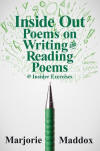 Calling all teachers and parents. In these
strange new days of ours, a great way to engage
bored and lonely young people is poetry …
writing about themselves, about the world, about
themselves in the world.
Calling all teachers and parents. In these
strange new days of ours, a great way to engage
bored and lonely young people is poetry …
writing about themselves, about the world, about
themselves in the world.Just in time comes Inside Out: Poems on Writing and Reading Poems, by Marjorie Maddox, a professor of English and creative writing at Lock Haven University who has published an impressive 20 collections of poetry and prose. Written for young writers, the book bristles with writing tools and ideas designed to show kids that “poetry” isn’t a bad word. “Chat with personification, dance with iambic, fish for sestinas, and text with a triolet,” Maddox writes on a welcome page. “In 27 poems plus Insider Exercises, this book will jump-start your writing.”
Chapters on how to see, hear, taste, smell, touch, and “befriend” a poem lure the reader into the poetry world, where Maddox provides a bevy of explanations and examples of such poetic elements as simile, alliteration, enjambment, and couplet. She then moves on to exercises designed to limber up the reader’s poetry muscles. Here’s an excerpt from one I like:
Exercise 7: The Short and Long of It
Here’s an
experiment: Copy a poem that you like, twice,
but take out the line and stanza breaks, so the
poem appears as one big block of words. Give one
copy to a friend.… Now, this part is secret.
Without showing a friend what you are doing,
each of you rewrite the poem with completely
different line and stanza breaks.… How do the
same words now seem a bit different? You may
notice that you read a long line more quickly
than a shorter one and that you tend to
emphasize words at the beginning and the end of
lines.… Next, take a poem that you wrote earlier
and rewrite it with different line and stanza
breaks. What happens? Which version do you like
better? Why?
.................................................................................................................................... Pollack and Poetry Poets are Zooming these days about their work in Heron Clan Poetry Anthology VIII, due out this month from Katherine James Books. The series, begun in 1999, features poets from all over North Carolina, as well as the United States and abroad. This year, editor Doug Stuber included one of my poems in the anthology:
Measured Flow
Scientists reveal the physics of Jackson
Pollack’s
painting technique.--
Brown University, 10/30/19
Drizzling honey on my breakfast toast
I watch it pool in spiral like a snake.
Coiling
instability scientists call it.
So, what did
Jackson Pollack know
of fluid
dynamics when he poured paint
on canvas to
make art?
Did he
experiment or did he just intuit
the way thick
liquids tend to curl
when poured from
up above?
You might think
any kid could do it,
but no – no
random swirls in Pollack’s
art, no mere
splatters, drips, or drabs.
It’s measured
flow, say physicists
who tried it.
Instinct or intellect, Pollack
harnessed
science for his art.
Toast in hand, I
ponder how to harness
science for my
poems, to taste creation
in the
discipline and skill.
 Can words heal? I’m not sure, but they can
definitely help. As the world worries its way
through the terrifying corona virus pandemic,
I’m thankful that it’s National Poetry Month.
Each day my email bursts with poetry, words that
take me out of myself and give me comfort,
meaning, and hope. Some poems bring wisdom and
wit; some provide new perspective; all provide a
way toward connection in a fractured world.
Can words heal? I’m not sure, but they can
definitely help. As the world worries its way
through the terrifying corona virus pandemic,
I’m thankful that it’s National Poetry Month.
Each day my email bursts with poetry, words that
take me out of myself and give me comfort,
meaning, and hope. Some poems bring wisdom and
wit; some provide new perspective; all provide a
way toward connection in a fractured world.These are the daily poems I receive:
- Poetry Daily, a partnership between the Daily Poetry Association and George Mason University
- Poem-a-Day, from the Academy of American Poets, which offers lots of specials for Poetry Month
- Knopf Poetry, a daily poem in April from the Knopf Doubleday Publishing Group
- The Slowdown with Tracy K. Smith, poems “hand-picked” by former U.S. poet laureate Tracy K. Smith, from American Public Media in partnership with the Poetry Foundation
- The Writer's Almanac, from Garrison Keillor
Another friend, Mike Maggio, Northern Regional Vice-President for the Poetry Society of Virginia, presents poetry each April day in a feature called 30 for 30, sponsored by Potomac Review. This year, which he’s calling Re(En)Vision, Mike has asked poets to take an original poem, delete every fifth word, and revise the poem, presenting it in stanzaic form (couplets, tercet, quatrains, etc.). The results are intriguing.
Finally, Katherine E. Young, former poet laureate of Arlington, Virginia, is posting a poem each day this month on Facebook. The poems are drawn from Written in Arlington, an anthology of Arlington poets edited by Katherine and forthcoming from Gargoyle Magazine/Paycock Press.
A daily dose of poetry may not cure covid 19, but don’t you feel better?
.................................................................................................................................... Meanwhile, Somewhere in the Universe … The latest issue of The Poeming Pigeon, an annual print journal brought to you by the wonderful folks at The Poetry Box, has taken the cosmos as its theme. The issue includes a poem of mine:
Immigrant Star
Alien Asteroids Are Here, Scientists Say. Get
Spinning from the interstellar
Used to Them.--New York
Times, 5/21/18
nursery, it joined our solar system,
a foundling from another star, t
taking up residence with Jupiter,
sharing the planet’s orbit
but like a willful child circling
the wrong way.
Call it an immigrant, torn
from its mother, wandering
through space to find a home.
Linked now with our largest planet
in orbital resonance.
Now we can
search beyond
our own sun to the far reaches
of the cosmos, track alien bodies
back to the big bang. If our solar system
can take in migrants, surely we can too,
welcoming them to join with us i
in synchronicity.
.................................................................................................................................... Academic
career, Army life, government positions,
international consultant--Minnesota-born Daniel
N. Nelson draws on a wide range of experience in
his new book
Minnesota and Other Poems. Published by
Atmosphere Press, Dan’s collection spells
out a full life in clear-cut, taut lines. “Dan’s
spare poems leave you searching for the rest of
the story: context, history, and future,” says
Eric Forsbergh, author of
Imagine Morning. “His poetry provides an
eagle’s view of what seems like a Minnesota
winter landscape, but on further examination
often draws you in with observations of the
fullness of living never quite realized, or
intimacy lost.”
Academic
career, Army life, government positions,
international consultant--Minnesota-born Daniel
N. Nelson draws on a wide range of experience in
his new book
Minnesota and Other Poems. Published by
Atmosphere Press, Dan’s collection spells
out a full life in clear-cut, taut lines. “Dan’s
spare poems leave you searching for the rest of
the story: context, history, and future,” says
Eric Forsbergh, author of
Imagine Morning. “His poetry provides an
eagle’s view of what seems like a Minnesota
winter landscape, but on further examination
often draws you in with observations of the
fullness of living never quite realized, or
intimacy lost.”
lucy
By Daniel N. Nelson
ok it was cheap chardonnay
but talking to you not
over miles
but within reach
and seeing your
eyes again
one san clemente evening
to tell listen
feel
touch
understand
never with you
but always near
if i whisper
you’d hear
far more
.................................................................................................................................... Goodbye to Mick’s A while ago, my husband and I took a leisurely Sunday drive and stopped for lunch at a sports bar outside Fredericksburg, VA. We no longer drink, and we’re not big sports fans, but we loved Mick’s--a cheerful, handsome place with great food. Naturally, I wrote a poem. When my poetry group praised the piece, I thought briefly of sending it to the restaurant’s manager. Naturally, I didn’t, but then, when Toho Journal Online published the poem in its fall 2019 issue, I thought maybe I really should send it. But alas, it turns out Mick’s Sports Bar has closed up shop. So with thanks to Toho and a sad thought for the bar, here’s At Mick's:
At Mick’s
in a different life I’d work at Mick's
By Sally Zakariya
wait tables maybe tend bar
get myself a scatter of tattoos
I’d have to learn to drink again
serve loaded mac ’n’ cheese on a don’t-
touch-it sizzling platter--crisp bacon
and chives and triple cheese on top--
serve six-buck margaritas on Mondays
I could learn to drink again
know all the
regulars hey howya doin’
not quite in Fredericksburg but
hanging on the
edge in one of those
nothing special
strip malls
but
Mick’s--Mick’s is special
with its
halfway-up rock walls
its oblong
shamrock bar in the center
its step-up
booths and keyhole chairs
its TVs on every
wall--well
maybe not for
everyone but
you could feel
like you belonged
and I could
too--if I decided
to learn to drink again
The other day, I tasted decadently rich mac and
cheese at another joint. Who knows what I’ll
write next?
....................................................................................................................................
 I’m
grateful for the obvious
I’m
grateful for the obvious
(family,
friends, health
but also the more obscure--
for the difference between
what something
is and what
it appears to be
and the space
in between and
the circuitous
routes we take
in that space.
And for the
space between words,
between music
notes--pauses
that can say so much. .
.................................................................................................................................... That Naked Country’
 “Like
Woody Guthrie
one finds Philip
Raisor holding
back the end of
the world,”
writes E.
Ethelbert Miller
of Raisor’s new
book
That Naked
Country.
“His poems slow
dance with the
past, from the
American
Revolution to
another black
body lying on
the ground.”
“Like
Woody Guthrie
one finds Philip
Raisor holding
back the end of
the world,”
writes E.
Ethelbert Miller
of Raisor’s new
book
That Naked
Country.
“His poems slow
dance with the
past, from the
American
Revolution to
another black
body lying on
the ground.” “Raisor reminds us that we have choices,” Miller continues. “History is still our home.” And it is history that confronts Raisor and his wife in Civil War photographs on a bedroom wall:
Under “The Dead
of Antietam”:
On the walls of our bed-and-breakfast hang
photographs by
Alexander Gardner (1862)
By Philip Raisor
stark images that lift us into yesterday’s dead.
We intended otherwise: naked play, late sleep,
a guided tour of the battlefield, aided by
Podcast,
a weekend away from the timeless chores of
living.
But history has its own way of waking up, if
only
to turn with a groan. Do you know how hard it is
to outlive antiques? I see the boy, that’s all
he is,
his gaping mouth praying its rebel yell, the
body
ignored by its soul. I see, though I close hard
against my eyes, the vacant stare of mutilated
bones crisscrossed in a long gully of failure.
I hear--how do I hear?--the crenulated wave
of wounded black grass stacked against cannons,
and your hand on my chest falls away in defeat.
If we came to see maps and hills and fences
that peace has reclaimed, we have been shown
that sometimes nothing can be salvaged.
And we, my love, like light slanting across
these frames, born in thunder too far back
to be heard, wonder if what has been lit
burns eternally. Until now, I have never
doubted the routines of earth, the perfect
fall and rise through all that waste. Tonight,
as the moon eases past this window toward
its usual burned-out campfire, I will fear
the ghostly shadows, I will fear that before
dawn the sun could get lost in the dark.
....................................................................................................................................
A Rich Collection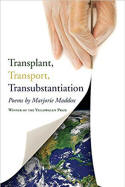 After reading Marjorie Maddox’s extraordinary
new book
Transplant, Transport, Transubstantiation, I
blushed to recall the poems I wrote after my own
father’s death. Unlike her stunning descriptions
of her father’s failed heart transplant, I
realized my pieces were simplistic, verging on
sentimental. Maddox, a professor of English and
Creative Writing at Loch Haven University, no
doubt could give lessons, and I could use them.
But simply reading these pages is a tutorial in
metaphor, line, sound, and the guts of poetics.
After reading Marjorie Maddox’s extraordinary
new book
Transplant, Transport, Transubstantiation, I
blushed to recall the poems I wrote after my own
father’s death. Unlike her stunning descriptions
of her father’s failed heart transplant, I
realized my pieces were simplistic, verging on
sentimental. Maddox, a professor of English and
Creative Writing at Loch Haven University, no
doubt could give lessons, and I could use them.
But simply reading these pages is a tutorial in
metaphor, line, sound, and the guts of poetics.
The five-part book concerns marriage, love, and
spiritual matters as well as the transplant of
the title. But to me, the heart of the book is
its central section, “Body Parts,” a
tour-de-force likening 39 organs and appendages
to everything from a stingray (the lung) to a
dog’s tongue (the pancreas). Here’s …
The Bladder
has had its bad days, but adjusts.
Empty, it’s a cup fit for a pint,
later, a dish rounding up liquid.
Filled to the brim, it’s the yellow belly of a
chameleon
ready to burst.
In the transplant waiting room,
a child asks her mother,
“Will Daddy love the same people?”
and I startle at the complications.
… Joy cracks
his rhythm in notes too strong to stay
in the grave, too staccato to listen
to sounds good-daying
in the bass of a previous page,
two-stepping still, though long
since played
.................................................................................................................................... Muslim Wife
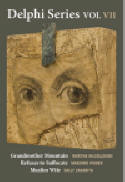 And now for something a little different: My
chapbook “Muslim Wife” is due out momentarily,
not as a stand-alone publication but as one of
three poetry collections published together in
Delphi Volume Seven. The brainchild of M.E.
Silverman, founder of
Blue Lyra Press, these three-in-one volumes
are designed to widen the distribution of a
poet’s work. “Our goal is to have each poet in
the volume gain new audiences by being exposed
to the other two poets’ readers,” says Silverman
on the Blue Lyra website. Included in this
volume, along with my chapbook, are “Grandmother
Mountain,” by Martha McCollough and “Refuses to
Suffocate,” by Marjorie Power.
And now for something a little different: My
chapbook “Muslim Wife” is due out momentarily,
not as a stand-alone publication but as one of
three poetry collections published together in
Delphi Volume Seven. The brainchild of M.E.
Silverman, founder of
Blue Lyra Press, these three-in-one volumes
are designed to widen the distribution of a
poet’s work. “Our goal is to have each poet in
the volume gain new audiences by being exposed
to the other two poets’ readers,” says Silverman
on the Blue Lyra website. Included in this
volume, along with my chapbook, are “Grandmother
Mountain,” by Martha McCollough and “Refuses to
Suffocate,” by Marjorie Power.It’s tempting to read the titles of these three chapbooks as a single sentence (Grandmother Mountain Refuses to Suffocate Muslim Wife), and once you do, it’s difficult to forget it. But these are three different collections, each with its own tone and message, each drawing (we hope) a new group of readers. As for me, I’m not a Muslim, but I’m married to one, which entitles me (I trust) to the title of my chapbook. This poem from “Muslim Wife” is about the reed pens used by my husband Mohamed Zakariya, a noted Arabic-script calligrapher:
Reed
It’s the right proportion of skin to meat
to record the history of dusty dynasties
you say, holding the slender reed pen
then cutting the chisel point and opening
the slit that holds the ink
It grew somewhere in Egypt, where reeds
have always grown, where they sheltered
the baby Moses, where they were chosen
by Pharaoh’s scribes
on papyrus, their wide eyes ringed with
kohl as they walked sideways on the
walls of the tomb
You hold the pen like a lover holds flesh
or the memory of flesh, with a quiet
resolve, touching ink to paper to record
a different history
 Not
in ParisIf this were Paris, I’d be on vacation. (They say
the city virtually empties out in August, you
know.) I’m not in Paris, alas, but I’m still
thinking about being elsewhere … somewhere away
from the heat and humidity and hassle of
Washington in the summer. I’d like to think my
phantom twin is on vacation, somewhere on the
continent perhaps. She’s often off somewhere,
after all. Never here, though I sense her
ghostly presence sometimes. Reading about the
phenomenon known as
chimerism ade her feel more real to me. I’m
grateful to
Contrary Magazine for publishing my poem on
the subject in their Summer 2019 issue:
Not
in ParisIf this were Paris, I’d be on vacation. (They say
the city virtually empties out in August, you
know.) I’m not in Paris, alas, but I’m still
thinking about being elsewhere … somewhere away
from the heat and humidity and hassle of
Washington in the summer. I’d like to think my
phantom twin is on vacation, somewhere on the
continent perhaps. She’s often off somewhere,
after all. Never here, though I sense her
ghostly presence sometimes. Reading about the
phenomenon known as
chimerism ade her feel more real to me. I’m
grateful to
Contrary Magazine for publishing my poem on
the subject in their Summer 2019 issue:
Chimera
By Sally Zakariya
Recent advances in genetic analysis have
revealed
that
chimerism is common.--Tim Flannery,
New York
Review of Books, March 7, 2019
Phantom twin who
never was
X and Y alike in
DNA
blood type both
A and O
chimera--two
eggs merged
and married in
the womb
The Greeks
imagined you
lion / goat /
snake mingled
a mythical
amalgamation
I sense you
hovering
a distant,
doubled being
an almost self,
unseen
and out of reach
You murmur from
afar
me / not me,
same yet not
complex
consciousness--
after all, which
one of us
is a single
thing alone
....................................................................................................................................
Questions about My Quartz
Watch
By Sally Zakariya
In a crystal we have the clear evidence of the
existence
of a formative life-principle.”--Nikola Tesla
How does the quartz make the watch
If the battery dies, can the secret vibration
in the quartz still give birth to a steady pulse?
When the crystal grows in the dark cave
does that constitute proof of life?
Is it true the movements of wave and wind
and celestial bodies exhibit natural vibration?
Can these movements be considered the breath
of the universe?
And is that why our thoughts hover in the air between us
vibrating to our natural frequencies, suspended
on our shared breath? .................................................................................................................................... Under the Sea
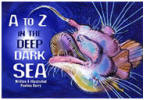 My
super talented niece Paulina Berry, scientist
and artist, has created a truly delicious
children’s book:
A to Z in the Deep Dark Sea, now available
for pre-order as an e-book. Her illustrations of
the denizens of the deep? Pure visual poetry.
....................................................................................................................................
A Moving Journey
My
super talented niece Paulina Berry, scientist
and artist, has created a truly delicious
children’s book:
A to Z in the Deep Dark Sea, now available
for pre-order as an e-book. Her illustrations of
the denizens of the deep? Pure visual poetry.
....................................................................................................................................
A Moving Journey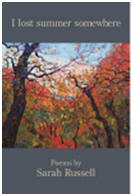 Sometimes you get the
feeling you know a person you’ve never actually
met. It’s like that with Sarah Russell. We “met”
online some years ago, swapping poems and
comments on
Goodreads, and now that I’ve had a chance to
read her moving collection
I lost summer somewhere, I almost feel she’s
been writing not just her life but mine. And
other women’s too.
Sometimes you get the
feeling you know a person you’ve never actually
met. It’s like that with Sarah Russell. We “met”
online some years ago, swapping poems and
comments on
Goodreads, and now that I’ve had a chance to
read her moving collection
I lost summer somewhere, I almost feel she’s
been writing not just her life but mine. And
other women’s too.Published by Kelsay Books, Russell’s collection takes the reader on a deeply moving journey through childhood, marriage, motherhood, and on. Her often brief poems show a deft touch: “Our fights were a barrage of arrows / going to the softest places, / as if everything depended / on the outcome,” she says in “Early Marriage.” Just four short lines, but a volume of meaning.
Equally striking is her three-stanza “Choice,” which begins with the poet holding her daughter’s hand during what could only have been an abortion and ends, “ ‘The baby would be in college now,’ / she said to me the other day. / ‘I know,’ I said.” A retired professor and editor, Russell has had a second life as an accomplished doll maker. In creating her dolls, she draws on her studies of myth and legend, imbuing her small sculptures (it seems almost a slight to call them merely “dolls”) with the same spirit and empathy she brings to her poetry.
Reflective, elegiac, powerful – the poems tell hard truths about hard topics like miscarriage, cancer, abortion, and divorce, and give gentle reminders of the soothing power of nature, the comfort of love. And the inevitable advance of age:
The novel in my head
has only time to be
a poem without
last lines
to tell the
reader
if she learned
to love
the baby, if
what the gypsy
said came true,
if the letter
was from him.
See more of Russell’s work on her website.
....................................................................................................................................
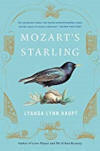 Mozart
and MeNo, not the music
(though I revel in it). What has brought me to
feel a special kinship with the great composer
is
Mozart's Starling, an entrancing book by
naturalist and ecophilosopher
Lyanda Lynn Haupt, which tells the story of,
yes, Mozart’s pet starling. I read a review of
Haupt’s book one evening and quickly ordered a
copy. Eying my wind-up tin songbird but
imagining a real bird on my shoulder, I couldn’t
wait to write a poem, which was published in the
July 2019 issue of
Burningwood Literary Journal:
Mozart
and MeNo, not the music
(though I revel in it). What has brought me to
feel a special kinship with the great composer
is
Mozart's Starling, an entrancing book by
naturalist and ecophilosopher
Lyanda Lynn Haupt, which tells the story of,
yes, Mozart’s pet starling. I read a review of
Haupt’s book one evening and quickly ordered a
copy. Eying my wind-up tin songbird but
imagining a real bird on my shoulder, I couldn’t
wait to write a poem, which was published in the
July 2019 issue of
Burningwood Literary Journal:
Mozart’s Starling
By Sally Zakariya
I read somewhere that
Mozart had a pet
starling
He called the
starling singvogel
or was that an old German toy
He taught the
bird to sing a song
or was it the
other way around
And did the bird
really come
when Mozart
called or did it
secretly wish it
belonged to
Constanze of the soft breast
nstead of Wolfie
(Johannes
Chrysostomus Wolfgangus
Theophilus Mozart to give
the man his
proper name)
If I had a
starling I’d call it
Constanze and ask it to sing
a song about the
brief musical
career of
Mozart’s starling
an avian
concerto from
one composer to another
.................................................................................................................................... Something Special
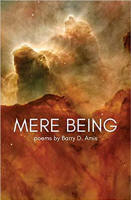 When the blurbs on the back of the book are by
three former poets laureate, you know you’re in
for something special. And
Mere Being , by Barry D. Amis, is special
indeed. Barry, long active in the Poetry Society
of Virginia, brings a musician’s ear as well as
an academic’s knowledge to his poems, which have
fascinated and delighted me for years in the
monthly poetry salon Barry chairs. And I’m not
alone. Here’s what reviewers say:
When the blurbs on the back of the book are by
three former poets laureate, you know you’re in
for something special. And
Mere Being , by Barry D. Amis, is special
indeed. Barry, long active in the Poetry Society
of Virginia, brings a musician’s ear as well as
an academic’s knowledge to his poems, which have
fascinated and delighted me for years in the
monthly poetry salon Barry chairs. And I’m not
alone. Here’s what reviewers say:
- “In poems well-honed and riveting, Barry Amis bears witness to the world’s struggles and enigmas.”--Carolyn Kreiter-Foronda
- “There is uncommon linguistic agility in Barry Amis’ work that brings words like ‘cradle’ and ‘cactus’ into insightful proximity …”--Sofia Starnes
- “One could do worse than trip in the tradition of Gerard Manley Hopkins and Charles Wright.”--Ron Wright
Here is another from Mere Being :
Pensées
By Barry Amis
These are the hours
and we are the
vessels.
Clothe me in the
full
trappings of
Paradiso
or comfort me in
measureless dark
places. Each
day’s
suffering craves
a
Beatrice. Each
night’s
gathering offers
milk
and pudding.
Waiting
is irrational.
Athens
and Jerusalem
debate,
heaven and hell
am I.
The last
dwelling
place summons,
humility and
love
are the
threshold.
About us these
bones
strip, innocence
lost.
The terra
mater
of canceled days
terrifies.
....................................................................................................................................
Reading Walt Whitman at
McDonald’s
By Sally Zakariya
McDonald’s afternoon … unexpected jazz
… low sun slicing in on French fries
blooded with ketchup … two graying men
with coffee … young man by the window …
trio of teenage boys posing and preening …
Whitman wrote of these men, or men like them
in Memoranda During the War, wrote
of bringing pencils and paper and consolation
to the wounded of both sides, walking among
regiments of iron cots, a shaggy buffalo
of a man, a man of generous heart
there the battle raging … Is this indeed
humanity—these butchers’ shambles?
Reading, I imagine the war-torn grief
buried beneath Walt’s bare ellipses
Closing my eyes, I am with him in a field
hospital here in Virginia … closing my eyes
I see a soldier so young he has hardly lived
at all lying limp on a stretcher, a farm boy
muddied with the red earth he once plowed
the earth where the bullet felled him
the earth he will lie in tomorrow and forever
I imagine we hold his hand … we wash his brow
we help wind bandages around him … the whitest
cloth … the tightest weave … folded thick against
the blood … folded thick to hold life in
The weak sun breaks through the smoke of war
trails pale fingers of light across his ravaged face
A wing of shadow passes and his eyelids flutter
and when he cries Mother we say
She is here … she is coming
 And
because you can never have too much Whitman, let
me recommend a new book:
Walt Whitman Speaks. Subtitled “His Final
Thoughts on Life, Writing, Spirituality, and the
Promise of America,” this inspiring collection
is drawn from the nine volumes of commentary
faithfully recorded in the last years of the
poet’s life by his young friend Horace Traubel
and selected for the Library of America by
Brenda Wineapple. Not a book to read through
start to finish, this volume is best dipped into
from time to time to see what insights you’ll
find. Quotes to remember: “The best writing has
no lace on its sleeves.” “If America is not for
freedom I do not see what it is for.”
....................................................................................................................................
A Poet’s Poet
And
because you can never have too much Whitman, let
me recommend a new book:
Walt Whitman Speaks. Subtitled “His Final
Thoughts on Life, Writing, Spirituality, and the
Promise of America,” this inspiring collection
is drawn from the nine volumes of commentary
faithfully recorded in the last years of the
poet’s life by his young friend Horace Traubel
and selected for the Library of America by
Brenda Wineapple. Not a book to read through
start to finish, this volume is best dipped into
from time to time to see what insights you’ll
find. Quotes to remember: “The best writing has
no lace on its sleeves.” “If America is not for
freedom I do not see what it is for.”
....................................................................................................................................
A Poet’s Poet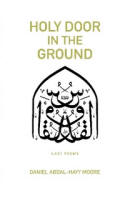 His first two books of poems were published in the 1960s by Lawrence Ferlinghetti of City Lights Books. At around the same time, he created and directed a puppet theater called the Floating Lotus Magic Opera Company. And after he became a Sufi Muslim in 1970, Daniel Abdal-Hayy Moore published an astonishing 40 more poetry books. Now this fine and luminous poet, this sweet spirit is no longer with us. After his death from cancer in 2016, his family has gathered his last poems in Holy Door in the Ground. Here is one from a series:
His first two books of poems were published in the 1960s by Lawrence Ferlinghetti of City Lights Books. At around the same time, he created and directed a puppet theater called the Floating Lotus Magic Opera Company. And after he became a Sufi Muslim in 1970, Daniel Abdal-Hayy Moore published an astonishing 40 more poetry books. Now this fine and luminous poet, this sweet spirit is no longer with us. After his death from cancer in 2016, his family has gathered his last poems in Holy Door in the Ground. Here is one from a series:Aphorisms to Death, 1
by Daniel Abdal-Hayy Moore
We must be patient with every
incapacity
for they are the machinery of Allah
taking us to a
quietude
where yellow
pastures slope down
to a cobalt sea
and sunlight
glistens on the sliding
backs of its
slippery
currents
To the Poet Who Is Not Here
for Daniel Abdal-Hayy
Moore, 1940-2016
You are not here but you are not gone.
We read from
your poems tonight in a room
of offerings, of
seekers.
Light falls from
the crystal chandelier
like beads of
dew nurturing dry soil.
Your words lift
winged from the page,
birds to the
heavens.
You who have
always had one foot
in the other
world, we rejoice at your joy,
O singer of
saints.
We linger on
your lines, gather the gifts
of your wisdom,
share in our mind’s eye,
if only for a
moment, your sight
of the Beloved.
We miss Abdal-Hayy, but he has left a treasure of writings to remember him by. .................................................................................................................................... Revision Revisited The Poetry Society of America postcard on my bulletin board says, “Revise, revise”--words writers live by. The way we generally approach revision is to cut, cut, cut. But poet Diane Lockward suggests another approach.
“Too often we start revising and hacking away at the poem before it’s even fully written,” she writes in Some Revision Ideas for Poetry Month. “We quit before we’ve given the poem life, before we’ve discovered its full potential, before we’ve found its real material.”
Instead, Lockward says, consider expanding rather than cutting your poem. For example, take 10 words from a poem you admire and try to fit them into your poem. “Make them make sense within the context of your poem, adjusting your context as needed,” she says. “Or let the words introduce an element of the strange, a touch of the surreal.”
Lockward cites a number of other ways to approach expansion, such as inserting negative statements, adding color and metaphor, putting something in “that seemingly doesn’t belong,” or personifying an inanimate object.
It’s worth trying. ........................................................................................................................................ The Magician’s Wife
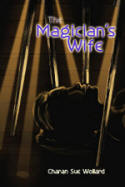 Journalist, artist, student of spirituality--Charan Sue Wollard, like Walt Whitman, contains multitudes. In her new book, The Magician's Wife, the poems flow from whatever her eye falls on: a bicycle tour, a peach on the windowsill, a legless beggar in India, a beetle, a child who will not speak. The book is new off the press from Richer Resources Publications, which also published Wollard’s In My Other Life (and which sponsors But Does It Rhyme). Wollard, former poet laureate of Livermore, California, has a rare gift for telling stories with power and insight. The assassination of Martin Luther King, Jr., unfolds from the perspective of a 17-year-old tending counter in a drugstore. A gas pipe explosion is recounted in what remains: a bowl of carrots, a broken clock, an unread newspaper. In other poems she captures the extraordinary behind the ordinary, the “small kindnesses … that separate any of us / from inconsequence,” the poet struck silent by the “loud clap of nothing / the thunderous void.” Perhaps Wollard’s “theory of everything” best describes her approach to her work: “eyes open / to every / impossibility.”
Journalist, artist, student of spirituality--Charan Sue Wollard, like Walt Whitman, contains multitudes. In her new book, The Magician's Wife, the poems flow from whatever her eye falls on: a bicycle tour, a peach on the windowsill, a legless beggar in India, a beetle, a child who will not speak. The book is new off the press from Richer Resources Publications, which also published Wollard’s In My Other Life (and which sponsors But Does It Rhyme). Wollard, former poet laureate of Livermore, California, has a rare gift for telling stories with power and insight. The assassination of Martin Luther King, Jr., unfolds from the perspective of a 17-year-old tending counter in a drugstore. A gas pipe explosion is recounted in what remains: a bowl of carrots, a broken clock, an unread newspaper. In other poems she captures the extraordinary behind the ordinary, the “small kindnesses … that separate any of us / from inconsequence,” the poet struck silent by the “loud clap of nothing / the thunderous void.” Perhaps Wollard’s “theory of everything” best describes her approach to her work: “eyes open / to every / impossibility.”
drowning
By Charan Sue Wollard
he wades into the water
despite warnings of danger
one instant raising his Nikon to capture
terrible roils charging the shore
perhaps to cast light
on how one thing leads
to another and another
without pause
a wave catches him by the ankle
drags him under its blue tide
a day before further
down the shoreline
at the South Tower
of the Golden Gate Bridge
a boy on a field trip glimpsed surfers
in the waves below
climbed the high rafters
took a reckless ecstatic leap
in the end--
if there is an end--
the man dies the boy emerges
dripping triumphant from the Bay
if I could ask them
one question
it would not be why
(I like anyone cannot fathom my own death)
if I could ask them one question
it would be
what
what did you find
what did you find
in that dark cold deep
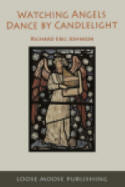 My prolific friend Eric Johnson has come out with his fourth book of poems: Watching Angels Dance by Candlelight. To read these poems “is to waltz, tango, and two-step to the insights of a master poet,” says Loose Moose Publishing, and I couldn’t agree more. “Johnson brings the life experiences of Saigon, Berlin, and Indianapolis into his word craft. The world is his oyster and the streets are his theater.” One striking poem from the book is the response of Johnson, himself a Viet Nam veteran, to the memorial to that war in Washington, D.C.
My prolific friend Eric Johnson has come out with his fourth book of poems: Watching Angels Dance by Candlelight. To read these poems “is to waltz, tango, and two-step to the insights of a master poet,” says Loose Moose Publishing, and I couldn’t agree more. “Johnson brings the life experiences of Saigon, Berlin, and Indianapolis into his word craft. The world is his oyster and the streets are his theater.” One striking poem from the book is the response of Johnson, himself a Viet Nam veteran, to the memorial to that war in Washington, D.C.
'V'
By Richard Eric Johnson
Black rock shining
Fifty thousand
and more names--
Monument or tombstone?
Frederick Hart’s soldiers
Stare and survey the V:
V for Viet Nam
Victory
Valor
Vengeance
Verisimilitude
Verification?
Why not ‘E’ for eternity.
Or an amazing
maze of marble
With no way out?
A journey over there
For a pilgrimage
here.
Names and
memories
Etched black
rock shining
Of their dreams.
We remain
Dreams of ourselves.
....................................................................................................................................
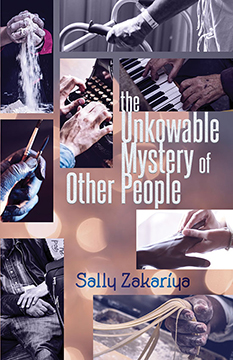 My good friend poet and children’s book author Jacqueline Jules and I meet every month to read and critique each other’s recent work. “Oh, another of your people poems,” Jackie would say as I handed over a few more poems about, well, people … some of whom I knew in childhood, some relatives and acquaintances, and some I had simply observed. (After all, in the old days before we were more carefully correct with language, British poet Alexander Pope famously said, “The proper study of mankind is man.”) I decided to gather some of my “people poems” together as a chapbook and shop the manuscript around. The result, The Unknowable Mystery of Other People, was a finalist in the 2018 Poetry Box. chapbook contest and is available until February 20 at a pre-release discount price of $10. Here’s one of the poems:
My good friend poet and children’s book author Jacqueline Jules and I meet every month to read and critique each other’s recent work. “Oh, another of your people poems,” Jackie would say as I handed over a few more poems about, well, people … some of whom I knew in childhood, some relatives and acquaintances, and some I had simply observed. (After all, in the old days before we were more carefully correct with language, British poet Alexander Pope famously said, “The proper study of mankind is man.”) I decided to gather some of my “people poems” together as a chapbook and shop the manuscript around. The result, The Unknowable Mystery of Other People, was a finalist in the 2018 Poetry Box. chapbook contest and is available until February 20 at a pre-release discount price of $10. Here’s one of the poems:Requiem for a Nobody
By Sally Zakariya
Unknown, unsung, no obituary
to spell out the bare facts of his life,
just one of the many to perish alone
on the street, hand still outstretched
for help that
would not come.
Lord have mercy on his soul,
&nb his nameless soul.
Death knew his name, called him by it,d
where he slipped by mostly unseen, /> wrapped in
a tattered gray blanket.
Death found him where he waited,
cheeks fallen in, eyes dimmed,
invisible to people bustling by.
Once someone tied his shoes, held
his hand, kissed his baby cheek,
but there will be no Pieta for him.
our oblivious souls. Did I say discount? Did I say February 20? Here’s where to order: The Unknowable Mystery of Other People. Thanks for the idea, Jackie – and thanks, Poetry Box. .................................................................................................................................... Words to Write By “Sometimes the poems come so fast that certain words are actually placeholders for the real words that are supposed to be there,” said poet Li-Young Lee, “and the work is to go back and figure out which words are the placeholders and which words are destined.” In other words, as the postcards that come every year from the Poetry Society of America say, “Revise, revise.” ........................................................................................................................................ The Fine Art of Blurbing A poetry blog with the delightful name Blogalicious recently addressed the fraught business of writing blurbs that will, the idea goes, encourage people to buy and read a book. Written by poet and publisher Diane Lockward, the post points some stern fingers at bad blurbs – those that say too little, those that make wild claims, those that are little more than quotes from the book. “I like blurbs that tell me something specific about the collection, something that will let me know if it’s for me or not,” writes Lockward in The Blurbification of Poetry Books. “I intensely dislike generic blurbs that could have been pasted onto the back of any number of books and give no evidence that the blurber even read the book being blurbed.” Reading her post reminded me how much we poets support each other – and depend on each other. I’m enormously grateful for the good people who have written blurbs for my chapbooks and am ready to return the favor. ..................................................................................................................................... Fish and Apples
 It’s snowing as I write this, tiny flakes that mean business. I like watching snow but not being out in it, and my mind turns to other seasons. Summer canoeing on Pleasant Pond at my aunt’s old cabin in Maine. Fall in the backyard of my childhood, picking up apples and tossing them for our dog Dusty to fetch.
It’s snowing as I write this, tiny flakes that mean business. I like watching snow but not being out in it, and my mind turns to other seasons. Summer canoeing on Pleasant Pond at my aunt’s old cabin in Maine. Fall in the backyard of my childhood, picking up apples and tossing them for our dog Dusty to fetch.Maine brings me to a poem by my friend Eric Forsbergh, author of Imagine Morning and a frequent contributor here. Eric, by the way, is no rank amateur: Carolyn Kreiter-Foronda, former poet laureate of Virginia, has called his poems “insightful, lyrical, and compassionate.” He’s writing mostly about DNA these days. (I sense another book of poems on the way.) Meanwhile, he’s made a few tweaks to a poem that first appeared in Imagine Morning and sent it here:
Of a Fish Laid Onto a Dock
By Eric Forsbergh
Disproportionate, the glass eyes
are fixed.
And what if
they could
follow you
as you prepare
to lift
the solemn
texture of the flesh?
It flips against
the boards,
rapid slapping
dying down.
Nothing bleeds,
not slender
articulations
of white bone
lips
torn
to free the
barb.
Gills in garnet
fronds fan out
flexing open
shut open shut:
the act of
drowning.
Until you cup
your hand prayer-like
behind its
slippery head,
touch with your
thin-honed knife
and push.
Apple Augury
“If
you wish to make an apple pie from scratch, you
must first invent the universe.”
-- Carl Sagan
Between the
birds and worms back then, Two Birds
Across our northern skies, two birds
We cannot know ourselves without knowing the
natural world.
Rebellion is adolescent; acceptance is maturity.
A poem arrives like a hand in the dark.
Maturity is to care more for a precious few
things, and much less about much else. Murmuration of Starlings
Dancing in the eastern sky A Cold Tuesday in Mid-March
Today holds no mercy for her-- Hospital Lobby
I’ve been to all of them, he says,
we lost half the apples from our backyard
trees and rushed to gather the ripe ones
that survived.
We loved the trees, their branches spread
like open arms, their sweet and heavy fruit,
their sturdy trunks two stalwart sentinels
on the lawn.
We loved the applesauce and apple
goody Mother made each year, loved
helping her put up stewed apples
for the wintertime,
rows of jars lined up next to tomatoes
and corn and watermelon pickle on the
curved shelves beneath the cellar stairs --
homey cornucopia.
A is for apple, the alpha fruit, the first
one babies name. Apple primeval,
fruit of the
tree. How many seeds, how
many sins.
Peeling apples
for a pie these days, I scatter
the stems and look for answers in the runes,
a kind of apple
augury, like casting the bones
to see what’s
coming next.
....................................................................................................................................
A Loss
Prominent Israeli writer, novelist, journalist,
and intellectual
Amos Oz died in late December. Even reading
him in translation, you sense the spare beauty
and tension in his words. The January 14 issue
of The New Yorker includes a moving Oz story
from 1963, “All Rivers.” The careful, almost
clumsy, way the narrator tells his story,
forever worrying about what came first, shows Oz
at his most empathetic yet controlled. Read it.
But what I will remember most about Oz is what
he is said to have replied when asked why he
wrote about sad people. “Happy people,” he
said,” tell their own stories.”
.....................................................................................................................................
Mature Love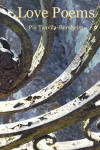 In the sweet heat of romance, young lovers may not realize how greatly their feelings for each other can endure and grow over time. But looking back on 40-some years of marriage, I know the love I feel for my husband now is not the same love I felt when we first married. It’s stronger, deeper, different … more mature. My Poetry Society of Virginia friend Pia Taavila-Borsheim comes to the idea of mature love from a different angle. After many years as a widow and single mother, Pia celebrates a late marriage in her new chapbook Love Poems, a clear-eyed, sensual homage to, yes, mature love. I recommend all the poems in this wise collection, but I especially like the many in which Pia turns her eye upward to the skies and the birds that fly in them. Here’s one of those poems:
In the sweet heat of romance, young lovers may not realize how greatly their feelings for each other can endure and grow over time. But looking back on 40-some years of marriage, I know the love I feel for my husband now is not the same love I felt when we first married. It’s stronger, deeper, different … more mature. My Poetry Society of Virginia friend Pia Taavila-Borsheim comes to the idea of mature love from a different angle. After many years as a widow and single mother, Pia celebrates a late marriage in her new chapbook Love Poems, a clear-eyed, sensual homage to, yes, mature love. I recommend all the poems in this wise collection, but I especially like the many in which Pia turns her eye upward to the skies and the birds that fly in them. Here’s one of those poems:
By Pia Taavila-Borsheim
charge and
wheel, the smaller sleek
in hot pursuit.
Perhaps the larger
skulked to raid
the newborn nest.
Perhaps a tuft
of food its beaked
desire lured.
Whatever the cause
of this flight's
rage, they grapple, peck,
fall and swoop.
The chaser nips
the other's
tail, ignores the odds,
defying physics,
brave in sheer
revenge, aloft.
I watch them wing
throughout the
morn, then turn to walk
long-rutted
fields. Briars, hawthorn
rise to snag.
Their gnarled beauty
hosts a single feather, black.
....................................................................................................................................
Telling the Truth
Epigrams succeed where epics fail, says a Persian proverb, and Egyptian-American poet and essayist Yahia Lababidi began taking those words to heart as a young boy. Before the days of Twitter and memes, Lababidi began distilling what he calls his soul’s dialogue with itself into aphorisms, pithy statements of principle or even truth. In Where Epics Fail., Lababidi’s second book of aphorisms, truths abound:
You can’t bury pain and not expect it to grow
roots.
They are not virtues if we are overly aware of
them.
Our vices make a
hell of solitude, our virtues a heaven.
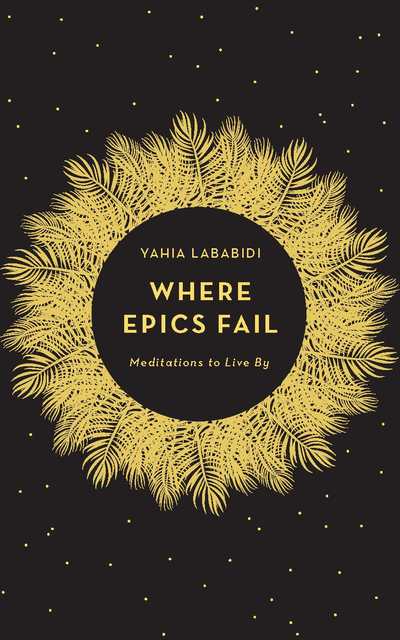 Or turn to page 204 and
consider the first two aphorisms:
Or turn to page 204 and
consider the first two aphorisms:
Maturing is sweetening.
....................................................................................................................................
Murmuring On my bucket
list, if I had
one, would
definitely be
watching a
murmuration of
starlings.
That’s what it’s
called when
hundreds,
sometimes
thousands, of
starlings fly in
swooping,
intricately
coordinated
patterns through
the sky. Seeing
a murmuration in
person would be
amazing, but
meanwhile I’ve
watched videos
on YouTube,
including one
that’s
especially
mesmerizing..
And (you knew
this was
coming), I’ve
written about
the phenomenon,
too. Here’s my
poem, which
appears in the
current issue
(volume 31) of
riverSedge:
On my bucket
list, if I had
one, would
definitely be
watching a
murmuration of
starlings.
That’s what it’s
called when
hundreds,
sometimes
thousands, of
starlings fly in
swooping,
intricately
coordinated
patterns through
the sky. Seeing
a murmuration in
person would be
amazing, but
meanwhile I’ve
watched videos
on YouTube,
including one
that’s
especially
mesmerizing..
And (you knew
this was
coming), I’ve
written about
the phenomenon,
too. Here’s my
poem, which
appears in the
current issue
(volume 31) of
riverSedge:
By Sally Zakariya
a bird cloud pulses out
draws in,
widening
and turning all
together--
a swirl of
starlings,
wings in
synchrony,
each bird
imperceptibly
invisibly,
communing
with the birds
nearby,
balancing
uncertainty
and consensus
A rule of seven, science
says, and more a
matter
of physics than
biology--
each small group
poised
on the edge of
transformation,
like crystals
forming, liquids
turning into
gas, metals
becoming
magnetized.
But what a
wonder, this
murmuration--a ribbon
of flight
unfurled against
the sky, eddy
and churn
of a thousand
wings
thrumming with life.
....................................................................................................................................
At the Traffic Light
“Thanks for reading
my poem,” the email
began, but thanks
really are due to
Michigan poet Claire
Weiner. “I’m a
clinical social
worker and
mindfulness teacher
when I’m not writing
poetry, short
stories, and
creative
nonfiction,” she
went on to say. You
can see that
thoughtful
background in the
little drama playing
out at the traffic
light in the poem
she sent us:
By Claire Weiner
the woman with the bad dye job
who struggles across Carpenter Road
with a shopping cart of groceries in plastic
bags.
She’s come from the discount food market
or maybe from CVS, using coupons
to buy groceries--cans of soup, crackers,
a small jar of peanut butter, an iridescent
orange
rectangle of cheese, along with her cigarettes.
The cart isn’t supposed to leave
the parking lot, but she’d be doomed without it
As it is, she has barely enough time
to cross with the green light, the March wind
blows
against her, her sweatshirt insufficient for the
feeble sun
and occasional snowflake.
I wait at the light in my late model car with
heated seats,
full of nonessential purchases from Target and
wonder
what would happen if I offered her a ride.
But what would she do with the cart?
When the light changes, I step on the gas.
....................................................................................................................................
Unknowable Mystery While my new
chapbook
Personal
Astronomy
was still at the
printer, I got
the exciting
news that
another chapbook
manuscript, “The
Unknowable
Mystery of Other
People,” was
accepted for
publication by
The Poetry Box.
A finalist in
that publisher’s
2018 chapbook
competition,
this collection
is all about
various people …
friends, family,
strangers, and
in between. It
won’t be
published until
sometime this
winter, but
meanwhile,
here’s one of
the poems:
While my new
chapbook
Personal
Astronomy
was still at the
printer, I got
the exciting
news that
another chapbook
manuscript, “The
Unknowable
Mystery of Other
People,” was
accepted for
publication by
The Poetry Box.
A finalist in
that publisher’s
2018 chapbook
competition,
this collection
is all about
various people …
friends, family,
strangers, and
in between. It
won’t be
published until
sometime this
winter, but
meanwhile,
here’s one of
the poems:
rocking back and forth, arms
wrapped around himself, every
shelter in the city, naming
them one by one, intoning
like a Biblical prophet
in a B movie. All of them.
Everyone looks away,
away from this embarrassment
in frayed sweatpants and bedroom
slippers. Every single shelter,
rocking harder and deeper
like water coming to a boil.
All I want is money for the bus,
money and something to eat.
It takes a hospital official, brisk
in suit and badge, to lead him
away, promising a hot cafeteria
meal. Everyone is pleased.
Smiles of satisfaction. Problem
solved. Embarrassment gone.
I can’t make it on my own out
on the street, he says, but
now no one is listening.
....................................................................................................................................
Ordinary/Extraordinary
 I’ve
been trying to catch up on some of the books
about poetry that I might have read as an MFA
student. I never was one, though, which explains
why, in my 70s, I finally picked up
A Primer for Poets & Readers of Poetry, by
Gregory Orr, who is called by the Poetry
Foundation “the master of the short, personal
lyric.” The book is an absorbing guide to
writing and reading poetry, from the interplay
of order and disorder in a poem to the wonderful
ways poets use rhythm, sound, and imagination to
bring their works alive.
I’ve
been trying to catch up on some of the books
about poetry that I might have read as an MFA
student. I never was one, though, which explains
why, in my 70s, I finally picked up
A Primer for Poets & Readers of Poetry, by
Gregory Orr, who is called by the Poetry
Foundation “the master of the short, personal
lyric.” The book is an absorbing guide to
writing and reading poetry, from the interplay
of order and disorder in a poem to the wonderful
ways poets use rhythm, sound, and imagination to
bring their works alive.
One section that struck me particularly was a
passage on, of all things, syntax. Citing the
“dislocations and deeper entanglements of the
American poet Hart Crane,” Orr quotes a
difficult passage of Crane’s “Voyages” and calls
it “an extremely expressive use of syntax, one
that mocks the skeletal parsing of sentence with
an image of fleshly, ecstatic flowing.
I couldn’t really follow the Crane passage, I
confess, so I felt better when I read on. ”I
would add, just to be clear about this,” Orr
writes, that I’m not really able to make any
ordinary sense out of these lines, even though I
think they’re rather amazing.”
Exactly. I have a friend who writes poems that
are striking for their sounds and images, but I
can’t always make “ordinary sense” out of them.
Even so, I think they’re extraordinary.
Yes, my chapbook Personal Astronomy is imminent (yay), and yes, I have another one coming this winter (more on that later). But now, in that aforementioned lull, I’d like to feature work by a couple of other, more inspired, poets.
..................................................................................................................................... Open Doors
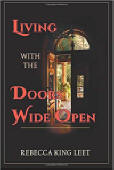 One such poet is
my friend
Rebecca Leet,
whose new book,
Living with the
Doors Wide Open,
is now available
on Amazon. In
this collection,
Rebecca brings
her journalist’s
skills of
observation and
her experience
of a life well
lived to a
collection of
engaging and
accessible
poetry. Her
poems touch the
universal behind
the everyday,
the sometimes
difficult truth
behind fallen
leaves, a
remembered piano
composition, the
burial of a
beloved dog.
Rebecca’s tone
ranges from the
bemused to the
elegiac: “Time
has tattooed
itself / across
my flesh,” she
writes in one
poem; in
another, she
hopes to “yield”
one day with the
grace of a
falling leaf.
“Stay facing the
sun that warms
you,” she
whispers to a
rose that, like
many of us, is
“a few petals
toward autumn.”
One such poet is
my friend
Rebecca Leet,
whose new book,
Living with the
Doors Wide Open,
is now available
on Amazon. In
this collection,
Rebecca brings
her journalist’s
skills of
observation and
her experience
of a life well
lived to a
collection of
engaging and
accessible
poetry. Her
poems touch the
universal behind
the everyday,
the sometimes
difficult truth
behind fallen
leaves, a
remembered piano
composition, the
burial of a
beloved dog.
Rebecca’s tone
ranges from the
bemused to the
elegiac: “Time
has tattooed
itself / across
my flesh,” she
writes in one
poem; in
another, she
hopes to “yield”
one day with the
grace of a
falling leaf.
“Stay facing the
sun that warms
you,” she
whispers to a
rose that, like
many of us, is
“a few petals
toward autumn.”Mothering Backwards
By Rebecca King Leet
I’m sorry, she says, what
are your
daughters’ names?
Those,
twenty-five and twenty-six,
for whom she’d
drawn down
Social Security
each month
to ensure they’d
go to college. And
whose University
of Virginia sweatshirt
and William and
Mary tee she’d worn
proudly. She’d
sit stone still, listening
to each story
Caitlin and Kristin shared.
I don’t remember
– what
are your
daughters’ names –
asks the woman
who was my mother
of the woman who is her mother now
..................................................................................................................................... ‘The Body that Smiles’
 “I heard the owls tonight,” my friend Janet
Dinsmore emailed me recently. Janet, who has
attended a series of poetry classes with me,
told me she has been looking for her voice in
poetry for many years. She was standing outside
her cottage near the Chesapeake Bay one evening
when she heard the owls.
“I heard the owls tonight,” my friend Janet
Dinsmore emailed me recently. Janet, who has
attended a series of poetry classes with me,
told me she has been looking for her voice in
poetry for many years. She was standing outside
her cottage near the Chesapeake Bay one evening
when she heard the owls.Gift
By Janet Dinsmore
Owls are communing
in the soft dark
wooh wooh, a soprano
then an alto
and another
I smile on the gravel road
actually I am inside the body that smiles,
the body smiling with my face
mouth curved happy up
unbidden, unintended…
the independent inner one
on its private
unpredictable
purer path
 Rejection. Rejection. Rejection. It’s hard to
keep submitting work for publication when
everything comes back “thanks but no thanks.”
And then suddenly comes acceptance of not one
but
three poems at the same time! In the same
journal! Thank you, thank you
Foliate Oak Literary Magazine. for
publishing “Artic Fever,” “Still With Us,” and
“Bathtub Buddha” in your May issue. It’s enough
to make me keep on writing, keep on submitting.
Rejection. Rejection. Rejection. It’s hard to
keep submitting work for publication when
everything comes back “thanks but no thanks.”
And then suddenly comes acceptance of not one
but
three poems at the same time! In the same
journal! Thank you, thank you
Foliate Oak Literary Magazine. for
publishing “Artic Fever,” “Still With Us,” and
“Bathtub Buddha” in your May issue. It’s enough
to make me keep on writing, keep on submitting.Bathtub Buddha
By Sally Zakariya
Watching the water swirl down
the drain
I think of Australia –
does it really circle the other way
in the southern hemisphere
left hand one way, right hand
the other?
Do the gyres cancel each other out
when they collide at the equator
clogging the
drain
bathwater rising
a flood of soap and bubbles
bathing the earth?
No it can’t be – the world
is too steeped in dirt and grime
to be cleansed so easily.
Even the rain
that showers down
from Heaven
can’t wash the stains clean
without help from our tears.
In sections called 1) find literary journals, 2) follow directions, 3) cover letters matter [sort of], 4) keep good records, and 5) keep submitting, Manning gives a quick course in the art of getting your poems out there and in print or online.
“If you’re not one of those rare, lucky poets who have poems accepted on the first try, don’t worry,” she writes. “Most of us took a long time to get a first poem published, and sometimes even well-published poets have dry spells. Submitting poetry can be discouraging, but keep doing it.” Words to live by. After all, as Manning observes, it’s a numbers game. The more you submit, the more likely you’ll get one of those good-news acceptance emails. ..................................................................................................................................... There’s still time If you’ve been meaning to order my forthcoming chapbook Personal Astronomy but haven’t gotten around to it, never fear. The chapbook is slated for publication in mid-August, and there’s still time to reserve your copy. The poems “express a stargazer’s wonderment, doubt and acceptance of the extraordinary grounded in an ordinary life,” says one reviewer. Another calls the collection “a poetic journey into the microcosm of love and relationship juxtaposed against the backdrop of the universe in poems that are as lucid and ordered as the constellations they invoke.” Buy a copy and the stars will shine on you. ..................................................................................................................................... Coming Soon(ish)
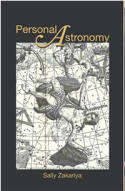 My forthcoming chapbook “Personal Astronomy” is
now available for pre-order from
Finishing Line Press. I’d like to think
people will enjoy the poems inside, and I’m
hoping they’ll like the cover illustration as
well. It’s a detail from a star chart by Johann
Elert Bode (1747-1826) showing the constellation
Andromeda. (That’s her, reclining among the
stars.) When I first mentioned
"Personal Astronomy". here a couple of
months ago, I included a poem that will be in
the chapbook, “Constellations.” Poet Dianne
Silvestri responded with a poem of her own.
(Dianne, by the way, wrote the charming “Summer
Treasure” in
Joys of the Table..)
“Since you invited correspondence,” she wrote
me, “I am drawn to send you a poem of mine I
recently resurrected which I thought of as I
read your ‘Constellations.’”
My forthcoming chapbook “Personal Astronomy” is
now available for pre-order from
Finishing Line Press. I’d like to think
people will enjoy the poems inside, and I’m
hoping they’ll like the cover illustration as
well. It’s a detail from a star chart by Johann
Elert Bode (1747-1826) showing the constellation
Andromeda. (That’s her, reclining among the
stars.) When I first mentioned
"Personal Astronomy". here a couple of
months ago, I included a poem that will be in
the chapbook, “Constellations.” Poet Dianne
Silvestri responded with a poem of her own.
(Dianne, by the way, wrote the charming “Summer
Treasure” in
Joys of the Table..)
“Since you invited correspondence,” she wrote
me, “I am drawn to send you a poem of mine I
recently resurrected which I thought of as I
read your ‘Constellations.’” August Midnight
By Dianne Silvestri
The ranger locked the gate
at sundown, our group inside
to camp at Bluffton Game Preserve.
We unrolled sleeping bags
like planks to bridge the road,
lay wide-eyed to observe
unobstructed midnight sky
of August set to astound us
with one shooting star after another,
all sites on the map overhead
firing meteors in rapid succession.
No one died while asleep
in the middle of that asphalt.
When we awoke the next morning,
in fact, we were all more alive.
Insomnia, 4 AM
The end of the world comes
when you’re awake
the dark clamor,
the rush of wings,
the taste of
copper in your throat,
the jagged wire
of dread dragged
through your
veins and capillaries.
You don’t get to
sleep through this.
The moon may
hang a jaunty lantern
outside your
window, but you see the scowl
on its face, you
grasp the sheer dimension
of the final
freeze.
No welcome thaw
to come. No cozy sleep.
Not even dreams
of sleep.
When the end of
the world comes
you will still be awake.
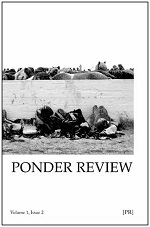 A recipe box is a little history not just of
dishes you love but also of the people who
taught you how to make them. Take dessert: Even
though I try to stay away from cakes and pies
these days, that wasn’t always the case.
Flipping through the recipes in my box brings
family members and old friends sweetly to mind.
My thanks to the Mississippi University for
Women for including this poem in the Fall 2017
issue of
Ponder Review:
A recipe box is a little history not just of
dishes you love but also of the people who
taught you how to make them. Take dessert: Even
though I try to stay away from cakes and pies
these days, that wasn’t always the case.
Flipping through the recipes in my box brings
family members and old friends sweetly to mind.
My thanks to the Mississippi University for
Women for including this poem in the Fall 2017
issue of
Ponder Review:Their Desserts
By Sally Zakariya
Robin, who couldn’t hide her
innocence, maker of poppy
seed cake,
unhappy in love, leaning toward the nunnery
last I heard
Jeanne of the
freckles and flaming orange hair, never quite
one of our group
and remembered mostly for her
carrot cake
Willie,
practical Midwesterner who did it all a year
ahead
and better, who
served flaky almond pastry from her
Dutch forebears
friends and
family all filed together in the old recipe box
under Cakes and
Cookies along with others -- Mother’s
there of course
no baker, still
we relished her peach skillet pie and apple
goodie, sweet
memories neatly recorded in her own left-
leaning hand
Nancy, too, big
sister who settled into a domesticity I envied
but failed to
emulate (I never make her pecan pie but savor
the recipe)
and you, Aunt
Betty, your spice cake topped with tangy lemon
sauce deserves a poem of its own, warm and
pungent, starting
with the same
simple stuff as all the rest -- flour, butter,
sugar, eggs
-- but how
various the cooks, how various their desserts
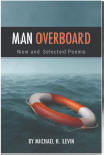 I’m
always delighted to see new work by poets I
know, even if I only know them through
publishing. Case in point: Michael H. Levin,
whose delicious poem “Jiro Dreams of Sushi”
(after the movie by the same name) appeared in
Joys of the Table. Levin’s new collection,
Man Overboard, is now available for preorder
from
Finishing Line Press.
I’m
always delighted to see new work by poets I
know, even if I only know them through
publishing. Case in point: Michael H. Levin,
whose delicious poem “Jiro Dreams of Sushi”
(after the movie by the same name) appeared in
Joys of the Table. Levin’s new collection,
Man Overboard, is now available for preorder
from
Finishing Line Press.“Michael Levin’s poems are a captivating collection of dramatic slices of life netted over the course of decades,” writes one critic, and another adds, “Levin’s poetry circumnavigates the globe like a time-traveling Indiana Jones and sticks a shiny fork deep into earth’s volcanic heart.”
The title poem, which first appeared in Poetica Magazine, tells a tragic story with Levin’s characteristic economy and Imagination
Man Overboard
(C.G.R., d. 2004)
By Michael H. Levin
Dark head bobbing in a
chevron wake
disconnected as the space surged
you slipped through the O
of our grasp.
Cool as Wisconsin, you forgot
safe dreams are toxic, that fear is how we fly
--
stood off, maneuvering. We scan your log now
seeking its theme.
Cold virtues are an ancient curse --
they reek of Artemis and Mimë.
To wall one’s heart with denial, is to
starve the self away.
Our saving grace is to open
like glories; for openness is all
the earth we have, we dots on the
sliding gray plates
of a following sea.
 Bon
Appetit
Don’t forget to “Like” our
Joys of the Table Facebook page. And check
back often! We’re adding poems and recipes from
time to time and would love to hear from you.
....................................................................................................................................
Bon
Appetit
Don’t forget to “Like” our
Joys of the Table Facebook page. And check
back often! We’re adding poems and recipes from
time to time and would love to hear from you.
....................................................................................................................................
What Are You Writing?
Why should we get all the
bylines? Submit your latest poem—just one for
now—and we’ll publish the poems we like best in
an upcoming blog post. Simultaneous submissions
are fine, but please let us know if the poem is
accepted or published elsewhere. Send your poem,
plus a few lines about yourself, in the body of
an e-mail message to:
poetryeditor@RicherResourcesPublications.com
You
Are Here
Welcome to
But Does it Rhyme?
INVITE US TO YOUR INBOX! Would you like to
receive our monthly newsletter? Sign up
here.
We're a
small, but hopefully growing, band of poets who
like to talk about our craft and share what
we've written. We'll highlight favorite poets,
review new books, and explore the process of
writing poetry from inspiration to conclusion.
(We might venture into essays and short fiction,
too.) We hope you'll like our blog — and
contribute your own thought and poems.
Sally Zakariya, Poetry Editor
Richer Resources Publications
Charan Sue Wollard
(LivermoreLit)
Kevin Taylor
(Poet-ch'i)
Sherry Weaver Smith
(SherrysKnowledgeQuest)
Richer Resources Publications/em>
ARCHIVES